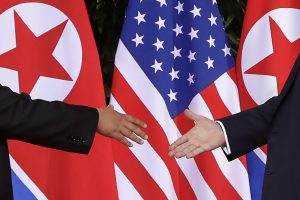A senior North Korean official said Tuesday that working-level talks with the United States will resume on Friday, October 5, according to a report published in state media.
Choe Son Hui, North Korea’s first vice minister of foreign affairs, said that the two sides would make “preliminary contact on Oct. 4 and hold working-level negotiations on Oct. 5,” according to the official Korean Central News Agency (KCNA), North Korea’s external-facing news agency. No venue for the upcoming meeting was specified.
“The delegates of the DPRK side are ready to enter into the DPRK-U.S. working-level negotiations,” Choe said. “It is my expectation that the working-level negotiations would accelerate the positive development of the DPRK-U.S. relations,” she added.
The talks are expected to be led by U.S. lead negotiator and special representative for North Korea, Stephen E. Biegun, and his North Korean counterpart, Kim Myong Gil, who was recently the North Korean ambassador to Vietnam.
The talks will be the first diplomatic contacts at a working-level since before the February 2019 summit between U.S. President Donald J. Trump and North Korean leader Kim Jong Un in Hanoi, Vietnam. That summit ended without any agreement.
On June 30, Trump and Kim met again, for a third time, informally at the inter-Korean Demilitarized Zone Joint Security Area. At that encounter, they resolved to restore working-level talks.
Since then, North Korea has conducted multiple rounds of short-range ballistic missile tests and lashed out at the United States and South Korea for conducting military exercises, which Pyongyang said was a violation of a promise Trump had made to Kim at the June 30 encounter.
Tuesday’s announcement by Choe follows a speech by Kim Song, the North Korean permanent representative to the United Nations in New York, at the United Nations General Assembly general debate.
In that speech, Kim emphasized that North Korea had “expressed our willingness to sit with the U.S. for comprehensive discussion of the issues we have deliberated so far,” but that this willingness was dependent on the U.S. finding “a calculation method that can be shared with us.”
Since taking a number of unilateral steps last year, including the dismantlement of its Punggye-ri nuclear test site and announcing a moratorium on nuclear and intercontinental-range ballistic missile tests, North Korea has signaled that it expects some sort of concession from the United States — likely in the form of sanctions relief.
The U.S. negotiation position in Hanoi, however, was uncompromising. The U.S. side insisted that North Korea agree to a detailed denuclearization roadmap, which would then be implemented in steps.

































